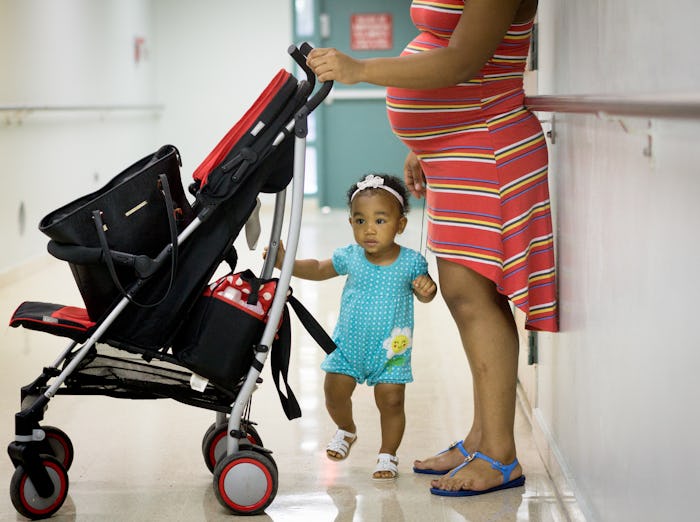News

6 Maternal Health Problems The US Has That Other Countries Don't
For several years now, the United States has been making headlines for the state of its maternal health — and not exactly in a way that warrants celebration. As it turns out, even as maternal mortality rates have dropped around the world, the United States' has been rising, despite continuing innovations in health care and a robust economy. And high maternal mortality rates aren't the only problem: in fact, there are six maternal health problems that the United States has that other developed countries simply don't.
The United States may be one of the richest countries in the world, according to Business Insider, but somehow, that wealth hasn't translated into health and safety for the nation's mothers. According to Save the Children's State of the World's Mothers report in 2015, the United States ranks in a shocking 61st place when it comes to maternal health, giving it the lowest maternal health ranking among developed countries.
Clearly, the United States needs to step up its game when it comes to improving mothers' health. In order to do that, it's going to need to take a multi-pronged attack, since there are several factors contributing to the country's low maternal health ranking.
The United States Has A High Number Of Unintended Pregnancies
According to the Guttmacher Institute, the United States has a significantly higher rate of unintended pregnancies compared to other developed nations. Since many women aren't expecting their pregnancies, they don't prepare adequately for them or deal promptly with chronic health issues, both of which can impact maternal health, according to NPR.
If the United States wants to lower its rate of unintended pregnancies, medical groups have warned, both birth control and abortion need to be easier to access, without unnecessary medical or financial barriers.
American Women Also Suffer From Higher Rates Of Chronic Disease
Over a third of adult Americans have obesity, according to the Centers for Disease Control and Prevention, and obesity introduces new challenges when it comes to pregnancy and maternal health.
"The body is already stressed by obesity and the other accompanying diseases, such as hypertension, diabetes and things that accompany that and then you put the demands of pregnancy on top of that and it's just very difficult," Elise Turner, associate professor of nursing at Mississippi's Belhaven University, told CNN in 2015.
Moms Aren't Guaranteed Paid Leave, So They Put Their Health At Risk
According to Forbes, the United States is one of just a handful of countries in the world that doesn't guarantee new moms paid maternity leave, and that has a direct effect on moms' health. Research has found that returning to work too soon after welcoming a baby can lead to higher rates of postpartum depression — but without a guaranteed income, many American moms have no other choice but to head back to the office soon after giving birth.
Moms Don't Get Sufficient Medical Attention During Childbirth...
According to NPR, the United States has had an increasingly strong focus on babies' wellbeing during childbirth — while moms' health and safety often gets far less attention from doctors.
"We worry a lot about vulnerable little babies," Barbara Levy, vice president of health policy and advocacy at the American Congress of Obstetricians and Gynecologists, told NPR in May. "We don't pay enough attention to those things that can be catastrophic for women."
... And We're Not Giving Them Enough Information On How To Care For Themselves Postpartum
In the United States, women are given a ton of information on how to monitor their newborns for signs of trouble, but not enough on how to care for themselves postpartum.
The problem is clear when you take a look at something like the United States' rate of preeclampsia deaths (which only occur during pregnancy or after birth). Between 2012 and 2014, Britain had only two mothers die of preeclampsia, while the United States typically loses 50 to 70 moms a year to preeclampsia, according to NPR.
Women Need Easier Access To Health Insurance
According to Christy Turlington Burns, the founder of Every Mother Counts, a shocking 13 percent of all pregnant women in the United States do not have medical insurance — and that lack of insurance has a direct effect on maternal health rates in the United States. "American women who lack health insurance are 3-4 times more likely to die from pregnancy-related complications than women who have insurance," Turlington Burns told CNN in 2015.
With all of those issues in mind, it's no wonder that the United States ranks last among developed countries when it comes to maternal health. Fortunately, the more aware Americans become of these problems, the more they can demand better healthcare for moms and raise awareness of the issues involved — because it's high time the United States did better by its moms.